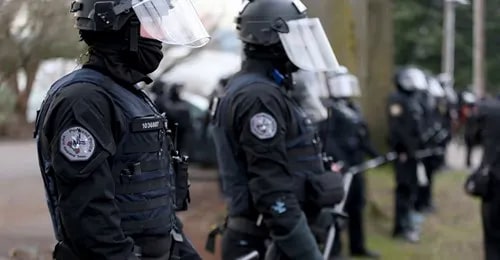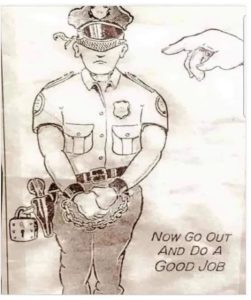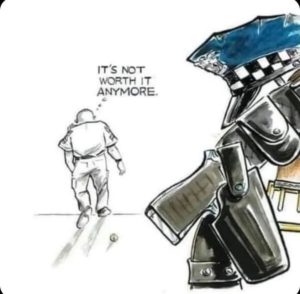By Maxine Bernstein | The Oregonian/OregonLive
They trashed police management.
They mocked city leaders.
They bemoaned the lack of true community-based policing.
And they were all Portland officers and supervisors who chose to leave the state’s largest police force in the last year.
In 31 exit interview statements, the employees who turned in their badges or retired were brutally frank about their reasons for getting out.
“The community shows zero support. The city council are raging idiots, in addition to being stupid. Additionally, the mayor and council ignore actual facts on crime and policing in favor of radical leftist and anarchists fantasy. What’s worse is ppb command (lt. and above) is arrogantly incompetent and cowardly,” one retiring detective wrote.
“The only differences between the Titanic and PPB?” he continued. “Deck chairs and a band.”
Since July 1, 115 officers have left the Police Bureau, including 74 who retired and 41 who resigned. Two more will resign by the end of this month and one more is retiring. They make up one of the biggest waves of departures in recent memory.
Filling out the exit interview forms is voluntary. About a quarter of those who left in the last year chose to do so.
Nearly all who did said they were dissatisfied with the bureau’s ability to respond to problems and said they wouldn’t recommend their jobs to family or friends.
The Oregonian/OregonLive obtained the forms through a public records request.
The bureau redacted the officers’ names and years of service, but they wrote down their most recent assignments. The responses came from an assistant chief, lieutenant, sergeants, detectives and patrol officers. One non-sworn employee, public records specialist, also filled out a form.
The mass exodus, also a phenomenon in other big U.S. cities, coupled with a hiring freeze since July, has created significant vacancies – 93 sworn officer positions and 43 civilian positions as of mid-March.
The Police Bureau is authorized to have 1,210 positions – 916 sworn and 294 non-sworn jobs.
A handful of officers followed retired Assistant Chief Ryan Lee to the police department in Boise, where he’s now police chief.
Other officers have left to work at other police agencies in the state, including Oregon State Police, the Clackamas County Sheriff’s Office and Hillsboro police.
At least another dozen officers have applied to other agencies and are going through the backgrounding process, the Police Bureau estimated.
Officers on patrol can’t help but notice a handful of large billboards posted around the city advertising that the Spokane County Sheriff’s Office is hiring for 40 mid-career officers.
Some of those who left said their heavy workload drove them out. One said everyone is “overworked, overwhelmed and burned out.”
Others said they felt their efforts to solve crimes or protect the public were for naught.
“Budget cuts, unit cuts that put the community at risk made working for Portlanders feel like a waste of effort,” one retiring patrol officer wrote.
Police leaders acknowledge the morale problems and Portland’s particular place in the national reckoning against racial injustice and police violence. The city has been wracked by months of protest confrontations, lawsuits alleging excessive force by police and political reforms that cut the police budget amid a rising tide of shootings and homicides.
Complaints about city politics are beyond the control of the police brass, said Assistant Chief Mike Frome, who oversees the bureau’s Personnel Division.
“A lot of those things in those exit interviews, nobody in the chief’s office have any power over,” Frome said. “We don’t have any power over City Council. We don’t have any power over the mayor or the governor or any members of City Council. We can only focus on what we can do here.’’
And that, he said, is working to support officers and cultivating interested applicants until the bureau can restart hiring.
Mayor Ted Wheeler, who serves as police commissioner, said the city must foster a culture in the Police Bureau that “retains and enhances – and does not move us away from – a diverse, professional, and successful work force.”
“We ask a lot of our police,” he said in an email. “The city of Portland, like many other cities, is on an ambitious and aggressive mission to transform community safety and policing. Change management is a specialty occupation for a reason. It’s hard work for everyone involved.
“Our job as the City Council is to ensure a laser focus on building a better public safety system – and, as we pursue change to meet Portlanders’ needs and expectations, we must focus on support and care for our employees,” he said.
Some of the police who are leaving said they’ve found little to no support from City Hall. One training officer who retired in January also said officers are “de-policing due to fear of being accused of excessive force.”
“What the city council has done to beat down the officers’ willingness to do police work is unfathomable,” he wrote. “I have never seen morale so low. Officers leaving mid-career and sometimes sooner to go to other agencies. Officers retiring when they would have stayed longer if the situation were different.”
He said he knew it was time to go because he stopped looking forward to work that he once loved.
“It is no longer a fun place to work. … There is no end in sight and the negatives far exceed anything positive … hate what Portland has become.’’
CULTURAL COMPETENCY LACKING
Young officers of color have left, including Jakhary Jackson, who went to Boise, and Elise Temple, who was one of the Police Bureau’s recruiters.
Temple declined to comment on the record.
Jackson didn’t respond to messages but he was one of the officers who spoke out last summer about being on the front line of racial justice protests as an officer with the Rapid Response Team.
A graduate of Portland State University who joined the Police Bureau after working for Nike for 10 years, he said then that he became a cop because he “wanted to make the most out of my life by helping others.” He also was following in the footsteps of his father and aunt.
But Jackson said he was disgusted by the hatred he and other officers faced while standing on the police lines. He got hit by an explosive one night, felt tingling in his fingertips and heat from the device, and got berated by young white protesters.
Often when he tried to talk to someone of color at the protests, he said, “Someone white comes up and blocks them and tells them not to talk.” Or yells, “Eff the police … don’t talk to him.” He left shortly after he was named to be a new community engagement officer.
A Latino officer under 30 years old said he left in February for a better work environment. What would have kept him in Portland? “Actual community policing,” he wrote.
“It should be time to repair relations with the community,” he said. “The community aspect was not there.”
He also complained of officers on the force who are unable to relate to the community and said officers of color struggle to fit in.
A factor in his exit: “Too many officers believing they are better than the public because they are cops … Still too many officers who are not culturally competent & refuse to have an open mind about the struggles of the community.”
Only a handful of the 31 who filled out the forms were Black, Latino or Native American. Most were white men.
Many wrote about how the City Council is “out of touch with how and why police do their jobs.”
“Muzzle city officials – give decision making back to the 15th floor – respect all employees,” wrote one officer, referring to the chief’s floor at police headquarters downtown.
“People are leaving due to not believing in the mission any longer – feeling of hopelessness for a once thriving city,” another wrote.
A few retirees said they would have stayed if the bureau still had a retire-rehire program to return for two to six years. The bureau eliminated it last year because it’s more expensive to bring back veteran officers.
INTERVIEWS PROVIDE ‘SOBERING MOMENT’
Frome said he’s read every one of the exit interview forms and shares them with Chief Chuck Lovell, Deputy Chief Chris Davis and the two other assistant chiefs.
“I’m part of the group that’s up on the 15th floor that needs to take a look in the mirror and decide, ‘What can we do better?’ ” he said.
“There is a kind of a sobering moment of reflection that does go on when you read those.”
But Frome said he wasn’t surprised by the sentiments expressed given the year of protests and political upheaval, though he added, “Some of them had a level of intensity that I wasn’t quite expecting.”
Police leaders need to do a better job in “letting our officers know they’re appreciated, that we are constantly trying to advocate for them and make them feel wanted,” he said.
He recognizes times in the past year when it became too easy to get “caught up in the minutia of my job” and “forget about the people that were doing the work every day,” he said.
“I probably did not do a good enough job of making sure that they saw me enough, that they heard me enough, and that they really believe that I was there fighting for them.”
Police leaders are trying to be more transparent and accessible, Frome said.
Lovell, for instance, is working to hold more frequent Zoom sessions to update officers on changes in the bureau. Frome said he’s offering similar informational sessions on the city’s budget decisions.
He said he can’t offer higher pay or other benefits such as more vacation time to dissuade officers from turning in their badges, as those are governed by union contracts.
He recognizes that officers hired after 2007 have an easier off-ramp to join other police agencies in the state because they were hired under the state’s public employee retirement program, not the city’s unique police and firefighter pension fund. So their years as Portland officers will count toward their pensions even if they jump to another police agency in Oregon.
BUREAU GETTING APPLICANTS
Yet Frome said he remains optimistic that the Police Bureau can attract good officers if it gets the money to hire again.
FBI data from 2019, the latest available, showed there were 1.3 sworn officers per 1,000 population in Portland, or 889 sworn officers out of a 662,114 population. That’s below the average rate of 2.4 officers per 1,000 people nationally.
“I don’t think that anyone would say that the Portland Police Bureau of 10 or 12 years ago is anything like what we are now. … When you look at the people we’ve been bringing in the door over the last three to five years,” Frome said, “they are a different generation of police officer that are really committed to doing law enforcement differently than the people when I got hired, so we just need to continue on that route.”
The bureau currently has about 30 applicants on a hiring eligibility list who have yet to complete background checks.
The bureau also received 400 online applications late last year from people interested in becoming a Portland cop. Historically that number dwindles substantially when people wash out because they don’t meet the bureau’s qualifications or are eliminated during background checks.
If given a chance to hire, Frome said he’d tell candidates: “If they want to be part of a progressive police agency, this is where they’re going to come.”
“The problem with Portland right now is that we are too progressive compared to some of our neighbors,” he said, “and we are not progressive enough for some people in Portland.”
Lakayana Drury, co-chair of a Portland police community oversight group and director of the nonprofit Word is Bond, said he’s often asked how agencies can recruit and retain officers of color. His group strives to improve relations between young Black men and officers.
“You have to care about the issues that matter to Black people and people of color and provide an environment that’s welcoming to communities of color,” Drury said.
He said the frustrations and low morale in the Police Bureau speak to “the urgency of this moment to get policing right” and a need to forge a community policing model that truly reflects how residents want police to serve them.
“The officers want to be able to do a job they’re proud of and feels right to them,” he said. “If the community is not happy with you, that’s not a sustainable model.’’
‘CHALLENGING TIME TO BE A POLICE OFFICER’
Other large police departments also are experiencing exoduses, including in New York, Los Angeles, Seattle, Chicago and Minneapolis.
“It’s a challenging time to be a police officer, let’s face it,” said Chuck Wexler, executive director of the Police Executive Research Forum, a Washington, D.C.-based independent organization that does research on policing.
“The last year,” he said, “has been one crisis after another and in Portland in particular, which went through more than 100 days of non-stop protests.’’
When Wexler goes into rooms full of chiefs or officers “and you ask them would you recommend this position to your son and daughter and nobody raises their hand, that’s relevant because traditionally, police officers are your best recruiters,” he said.
Amid the push to shift money from police budgets to social services, Wexler said few people seem focused on “the question of who will want to be our police officers of the future?”
“I don’t think anyone is really focusing on it except for police chiefs,” he said.
After last year’s widespread unrest in the wake of George Floyd’s killing and now live coverage of the trial of the Minneapolis officer who knelt on Floyd’s neck, it’s unsettling to work in policing, Wexler said.
“At the same moment chiefs are trying to recruit, others are talking about how do we defund the police and get someone else to do what the police have been doing,” he said. “That’s a hard message if you’re the police chief trying to do your job and attract new officers.”
Police agencies should identify officers, particularly those of color, to work as recruiters and try to reach out to younger people in high school or college to encourage them to become cadets who can eventually be hired as officers, he said.
In Portland, the Police Bureau laid off half of its background investigators and no longer has any police recruiters.
A Black officer in her 30s who left this past year said she would have stayed longer as a recruiter but she felt it was the right time to go with all the changes occurring and hiring halted.
Wexler said with homicides increasing here and in other major cities, “at some point the reality of the situation is going to dawn on people. You still need cops. You just need good cops.”
“One day people will wake up and wonder,” he said, “where have all the cops gone?”
— Maxine Bernstein
Email at mbernstein@oregonian.com; 503-221-8212






